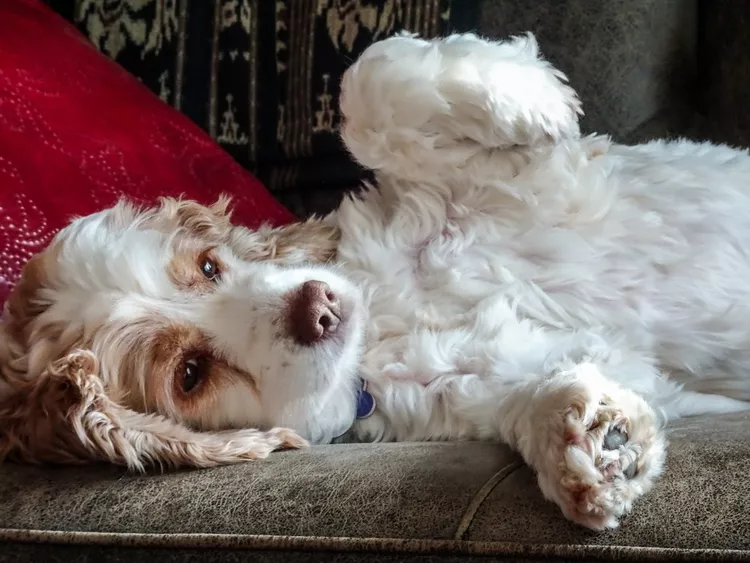Bloat in Dogs

Bloat, also known as gastric dilatation-volvulus (GDV), is a serious medical condition that occurs when a dog's stomach expands and rotates, trapping gas and preventing blood flow. Large breeds and deep-chested dogs are more susceptible to this condition. Bloat can happen very quickly and should always be considered an emergency because it can be fatal.
What Is Bloat?
Gastric dilatation-volvulus, or bloat, occurs when the stomach expands with gas, fluid, or food and then rotates in the abdomen. This creates a twist in the digestive tract at both the stomach's entrance and exit, trapping material inside the stomach. The spleen may flip over with the stomach as well. The rotation obstructs blood flow to the stomach and spleen, leading to necrosis (tissue death).
The stomach continues to expand and can put pressure on the vena cava, a major vein that carries blood from the back half of the body to the heart. The resulting decrease in blood flow to the heart can lead to shock, which is often fatal if not treated immediately.
Symptoms of Bloat in Dogs
Signs of bloat will vary from case to case and may be mild or absent in the early stages. If you have any reason to suspect your dog may be suffering from bloat, contact an emergency veterinary facility immediately.
A dog with bloat will typically exhibit restlessness due to discomfort. It will experience nausea with hypersalivation and retching or gagging. The dog will have an urgency to vomit, but the stomach contents will be trapped due to torsion. Saliva may be regurgitated, though, because it cannot enter the stomach when swallowed.
The dog's abdomen may or may not appear distended. Some dogs will vocalize due to abdominal pain while others will become lethargic and withdrawn.
The enlarged stomach may press on the diaphragm and affect breathing. Disruption of the circulatory system can lead to abnormal heart rhythm (arrhythmia). In some cases, the dog will collapse or become depressed and unable to get up.
What Causes Bloat in Dogs?
Researchers are still not completely certain why bloat occurs in dogs, but most agree that the following circumstances may increase a dog’s risk
- Breed: Large and giant dog breeds, especially deep-chested breeds (like Great Danes, Saint Bernards, Weimaraners, standard poodles, Basset hounds, Irish wolfhounds, golden retrievers, Doberman pinschers, Old English sheepdogs, and German shepherds) are particularly predisposed.
- Number of Meals: Feeding one large meal a day, instead of multiple smaller meals, can encourage bloat.
- Gorging on Food: Swallowed air during rapid feeding can quickly distend the stomach.
- Genetics: A dog with bloat in its lineage is more likely to experience bloat.
- Stress: Heavy exercise or anxiety-induced panting can cause a dog to gulp air, increasing the odds of bloat.
Elevated food bowls were once considered beneficial for large and giant dog breeds. However, some evidence suggests that elevating feeding increases the risk of bloat in dogs. While this is not certain, most vets recommend that dogs be fed at ground level.
How Do Vets Diagnose Bloat in Dogs?
Your veterinary team will work rapidly to stabilize and assess your dog. An IV catheter will be placed to administer fluids and medications that will address shock. An electrocardiogram (EKG) may be performed to check for cardiac arrhythmia. If necessary, medications may be given to stabilize the heart. Oxygen therapy may also be necessary if the dog is having difficulty breathing.
Abdominal x-rays will quickly be taken to look for stomach distention (gas, fluid, or food). Blood will then be drawn to run several tests; these typically include a complete blood count (CBC), chemistry panel (to assess organ function), electrolyte levels, and blood gas analysis.
Treatment for Bloat
While stabilizing your dog, the vet will try to decompress the stomach by passing a tube through the dog’s mouth. If this is not possible due to the twisting of the stomach, the vet may insert a large needle through the abdominal wall and allow air to expel.
Abdominal surgery will then be performed to rotate the stomach back into place and evaluate the tissue damage. Part of the stomach wall or the spleen may need to be removed if necrosis has occurred. The stomach will be stapled or sutured to prevent future rotation.
Prognosis for Dogs with Bloat
Most dogs recover from bloat with surgery and supportive care. However, the risk of fatality increases if the condition has lasted more than six hours, if heart arrhythmia is present, or if surgical removal of organ tissue is necessary.
How to Prevent Bloat
There are ways to prevent bloat or reduce the chances it will develop. These include:
- Gastropexy is the surgical attachment of the stomach to the body wall. This is the most effective means of prevention. When a veterinarian performs a gastropexy surgery, they suture the stomach to the body wall so that it cannot twist. In high-risk breeds, some veterinarians recommend preventive gastropexy to be performed at the time of spay or neuter.
- Changing a dog's feeding regimen can prevent gastric dilation. Feed two or more small meals per day, use a slow-feed bowl to discourage gorging, keep food and water at ground level, and restrict exercise before and after meals.
- Separating dogs during feeding can help decrease the natural urge to eat rapidly so that other dogs don't steal the food.